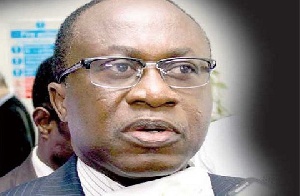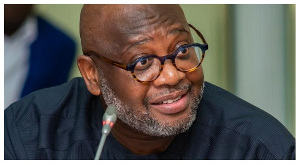The immediate-past Board Chairman of the National Communications Authority (NCA), Eugene Baffoe-Bonnie and four others who have been accused of causing financial loss to the state to the tune of $4 million appeared before the Supreme Court yesterday.
This was as a result of the decision of an Accra High Court hearing the matter to stay proceedings and refer Article 19 Clause (2) E and G to the Supreme Court for interpretation which emanated from a heated argument between state attorneys and the defence lawyers.
Appearing before the Supreme Court yesterday, a seven-member panel presided over by Justice William Atuguba ordered lawyers for the five accused persons to file their statement of case within two weeks.
Other members of the panel are Justices Julius Ansah, Sophia Adinyira, Jones Dotse, Gabriel Pwamang, Sule Gbadegbe and Yaw Apau.
The court also directed the state attorneys to file their statement after they had been served by the defence lawyers.
The case was adjourned sine die (indefinitely).
An Accra High Court, presided over by Justice Eric Kyei Barfour on February 1, 2018, stayed proceedings in the trial of former top officials of the National Communications Authority (NCA), who have been accused of willfully causing financial loss to the state and fraud.
They are Eugene Baffoe Bonnie, former Board Chairman of NCA, William Mathew Tetteh Tevie, former Director General; Nana Owusu Ensaw, a former chairman of finance sub-committee of the NCA; Alhaji Salifu Mimina Osman, a former National Security Coordinator on the NCA Board, as well as a private businessman, George Derek Oppong, Director of Infraloks Development Limited (IDL).
Godwin Tamakloe and Osafo Buaben, lawyers for Alhaji Mimina Osman and George Derek Oppong, respectively prayed the court to compel the Attorney General to furnish their clients with documents they intend to rely on for the trial pursuant to the Article.
According to Mr Tamakloe, Article 19 Clause 2 (E) of the 1992 Constitution provides that accused persons must be given ‘adequate time and facilities for the preparation of their defence which is within their fundamental human right.
In depositing an affidavit in support of an application, the defence lawyers held that the state must provide them with all documents, including those they do not even intend to tender.
The state, however, strongly opposed the motion, with Evelyn Keelson, a Chief State Attorney arguing that the Article was being wrongly quoted and that it is only the Supreme Court that has the power to interpret the Articles in the Constitution, if the need arises.
She said there are no rules that compel the state to supply accused persons with list of witnesses and witness statements three days before they are tendered to the court.
Justice Eric Kyei Barfour, in his ruling on the matter, held that if the court grants the prayer of the defence lawyers for the state to furnish the accused persons with documents three days before they are tendered, it would be prejudicial and subsequently dismissed it for lack of merit.
Citing other related cases, he said the court does not have the power to interpret the Article and risks interpreting it alone.
He therefore stayed proceedings at the high court and referred the three questions in respect of the Article to the Supreme Court for interpretation.
The Supreme Court is to determine whether the accused persons are entitled to disclosure and at what point should the prosecution furnish the accused persons with documents.
The court is also to determine whether in a summary trial, an accused person is entitled to the list of witnesses and witness investigation statements, as well as documents in possession of the prosecution even if they would not be tendered.
General News of Wednesday, 21 March 2018
Source: dailyguideafrica.com

















